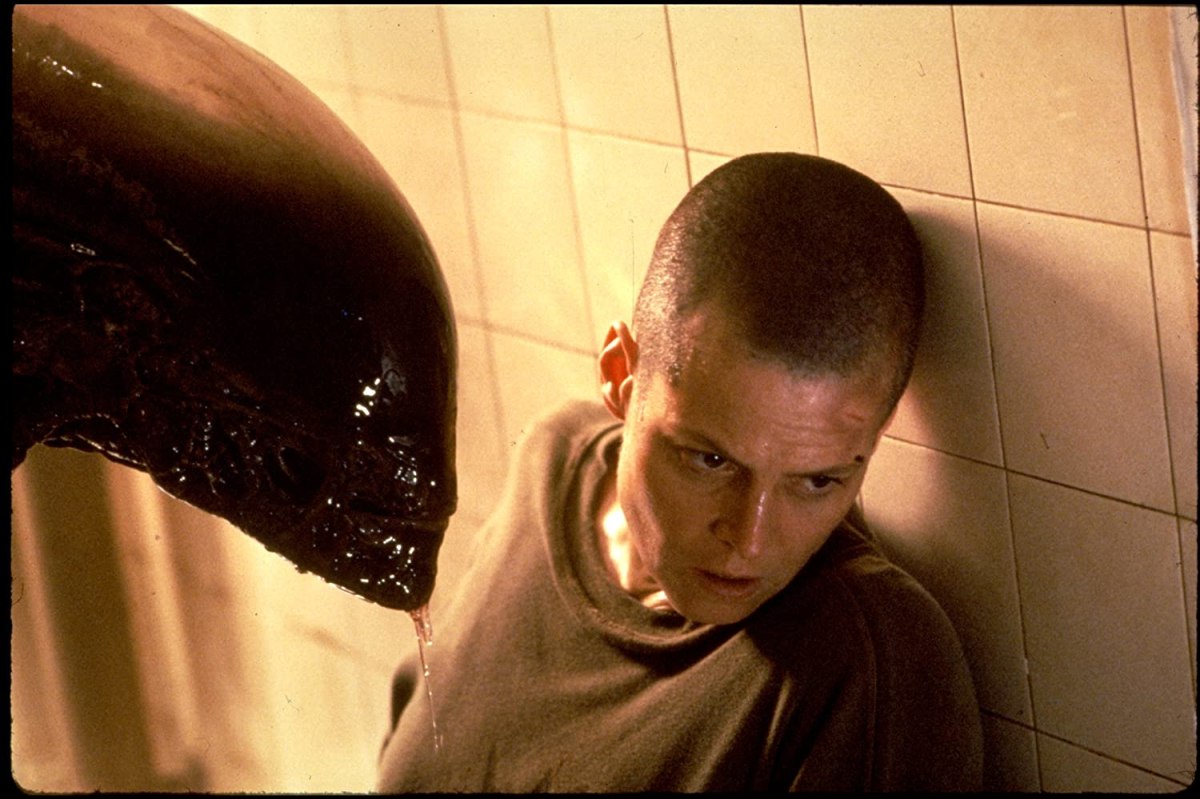The Alien film franchise unfolds in a cold and hostile universe, and no film in the franchise understands this better than Alien 3.
Of course, Alien 3 will always exist in the shadow of its two predecessors. The film had a notoriously troubled life both leading into and during production, those scars still evident in the finished cut. The “Assembly Cut” of the film is a valid and worthy attempt to restore something of what the film might have been, but there’s a reason David Fincher refused the label “director’s cut.” His vision is lost.
Nevertheless, there’s a lot to recommend Alien 3. The film commits to the franchise’s idea of a truly hostile cosmos, a universe that seems actively antagonistic towards the idea of life or meaning. It’s a surprisingly bleak studio blockbuster. It takes the cynicism of the original Alien film and runs with it, offering a world in which self-nullification becomes the only true exercise of agency.
This is obvious from the opening few minutes. Alien 3 begins with a firm rejection of the warmth and humanism that director James Cameron had injected into the franchise with Aliens. Of course, Cameron’s approach to Aliens was itself a rejection or interrogation of some of the core themes of the original Alien. This is what good sequels tend to do, after all.
Ellen Ripley (Sigourney Weaver) had survived the original Alien by rejecting gendered norms. In Aliens, these gendered norms subtly reassert themselves as Hicks (Michael Biehn) becomes a surrogate husband and Newt (Carrie Henn) becomes a surrogate daughter to Ripley, in keeping with Cameron’s recurring preoccupation with “the preservation of the nuclear family.”
Aliens is a fairy tale. Cameron bookended the film with shots of Ripley in hypersleep, so as to evoke Sleeping Beauty. There is a sense of progression to Ripley’s arc. At the start, she has lost her ship and crew and spent 57 years in hypersleep. The extended cut reveals that she had a daughter, who died two years before Ripley was found. At the end, Ripley has found a new family for herself.
Alien 3 immediately rips that away from Ripley. The opening scenes reveal that an alien face hugger stowed away in the craft, and that it killed both Hicks and Newt. This was a controversial decision, to say the least. Fan letters to Starlog decried it as “thoroughly offensive” and “a useless excuse for a plotline.” Cameron himself described it as “a huge slap in the face to the fans.” (It is no small irony that Cameron would subsequently sign off on the murder of a major character in Terminator: Dark Fate.)
Alien 3 doesn’t just kill off Hicks and Newt; it rubs the audience’s face in that grim and nihilistic perspective. The film features an extended sequence in which Ripley subjects both herself and the audience to a graphic and invasive autopsy of Newt. The theatrical cut then flouts one of the cardinal rules of audience empathy by having the face hugger infect an adorable and beloved dog.
This isn’t just punkish rebellion against a beloved predecessor. Alien 3 is entirely internally consistent in its worldview. Over the first half of the film, Ripley comes to empathize with Jonathan Clemens (Charles Dance), perhaps the most sympathetic of the inmates on the prison world on which she finds herself. In a wry gender flip of a stock trope, he dies almost as soon as she sleeps with him.
Alien 3 finds Ripley crash-landing on a prison colony, populated by the dregs of humanity. The film initially offers a grim view of both the inmates and the staff, with Ripley barely surviving an attempted sexual assault. However, the film slowly suggests that rehabilitation is possible for some of the inmates. Leonard Dillon (Charles S. Dutton) has found religion, and through that redemption.
There are moments in which Alien 3 seems to lean towards a more conventionally upbeat blockbuster structure. Maybe the narratives of Aliens will repeat themselves. Maybe Ripley will develop a meaningful emotional connection with Clemens, and maybe Dillon will prove that hope can flourish in this grim industrial hellscape. Maybe humanity can take root in the most unlikely places.

The extended Assembly Cut even features a false moment of triumph, when Ripley and Dillon coordinate the inmates to set a trap for the creature, managing to seal it in one of the vaults. In the world of Alien 3, the possibility of a happy ending is the worst sort of torment. Not for nothing did the film juxtapose Dillon’s eulogy for Newt with the birth of the monster.
Alien 3 returns time and time again to the idea of religion and belief. The xenomorph itself is repeatedly described as a “beast” or a “dragon,” calling to mind the biblical imagery of the Book of Revelation or the visions of William Blake. However, the film’s most cynical suggestion is that the Xenomorph itself might be an expression of divine will and judgment. (In this respect, Alien 3 feels like a forerunner to Ridley Scott’s meditation on faith and divinity in Prometheus and Covenant.)
Alien 3 treats its monster as a source of religious reverence, embodying the grim existential horror of Blake’s “The Tyger” — “Did he who made the lamb make thee?” In the Assembly Cut, Walter Golic (Paul McGann) releases the creature from its captivity in a sort of religious rapture. “Tell me what to do next,” he implores the abomination. His God cares not for his whims and feasts upon him.
What is there to do in a universe where the closest thing to divine will looks like a monstrous Xenomorph? There is no escape from this prison. Ripley resurrects what little remains of her reliable android Bishop (Lance Henriksen), but he has only one request for her. “Disconnect me,” he pleads, acknowledging that he could never fully be himself again. “I’d rather be nothing.”
The sentiment echoes through Alien 3. The film repeatedly suggests that the only mercy in this cruel universe is the embrace of oblivion. In his eulogy for Newt, Dillon argues that the audience should be glad she has been spared the horrors of this existence. “She will never know the hardship and grief for those of us left behind. We commit these bodies to the void with a glad heart.”

This philosophy applies to Ripley herself. For most of the film, Ripley evades and survives the alien monster. It initially looks like the creature is respecting Ripley’s narrative role as designated protagonist, but this is just another false hope. Ripley eventually determines that she has been impregnated with a xenomorph queen. She is to play the role of Mary in this grotesque nativity.
With this twist, Alien 3 seems cynical of itself. By the third film in the franchise, it is clear that Ripley and the alien are intertwined. Ripley will continue to fight the alien as long as the box office returns justify Sigourney Weaver’s fee. There is no escaping it. Ripley is trapped in this cycle of repetition and reiteration. Even if she escapes now, she’ll just end up facing it again in another sequel.
It’s the ultimate toxic relationship, but it’s the only one that exists because Ripley is a fictional character whose entire existence is built around the creature. The universe is designed, and it is the product of a hostile intelligence. In some ways, Alien 3 offers an extension of the critique of capitalism that runs through Alien and Aliens, applying it to the film franchise itself.
Alien 3 takes the nihilism of the Alien franchise to its logical conclusion, making Ripley’s only escape from these repeating narratives death on her own terms. It is no surprise that Sigourney Weaver herself argued for the death of Ripley, depressed at the cynical prospect of Aliens vs. Predator. It feels like an appropriate punchline that even death couldn’t keep Ripley out of Alien Resurrection.
The result is a fascinatingly grim blockbuster that commits wholeheartedly and without compromise to the core philosophical outlook of the Alien franchise: that the universe is inherently hostile to humanity. It then pushes even further, suggesting that the only reasonable response to such a cruel universe is self-negation.
Alien 3 is not simply a nihilistic blockbuster. It’s a $50M blockbuster that argues aggressively for nihilism in the face of a malevolent universe. That alone marks it as a worthy addition to the Alien franchise.






Published: Apr 25, 2020 11:00 am